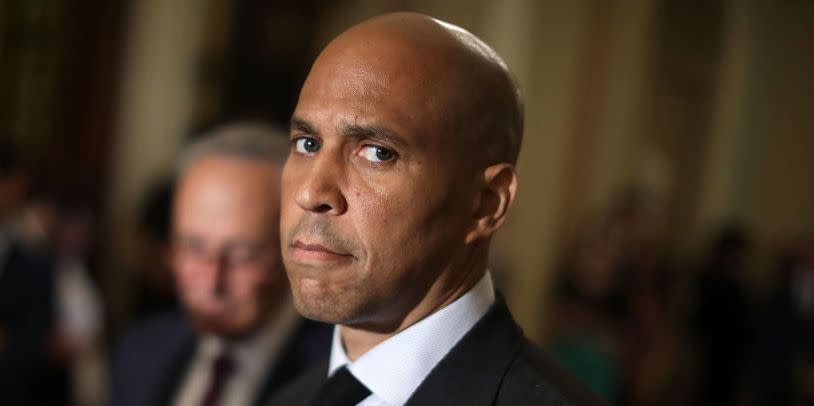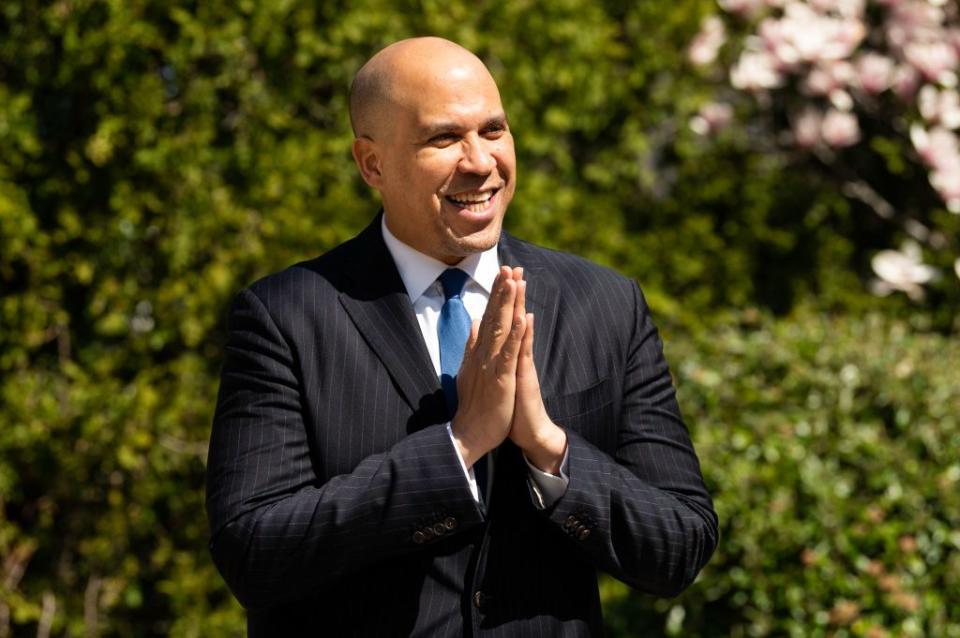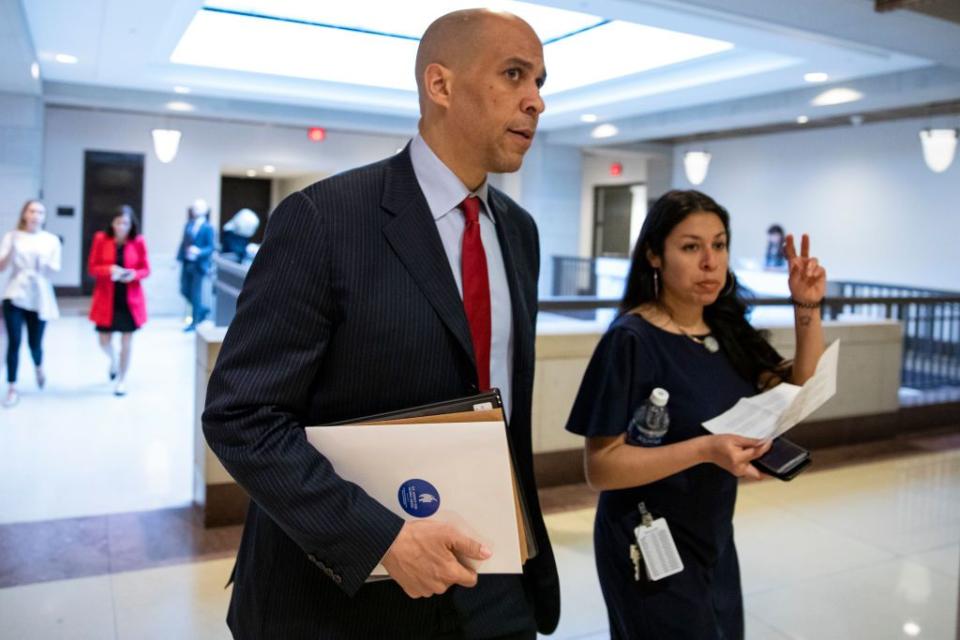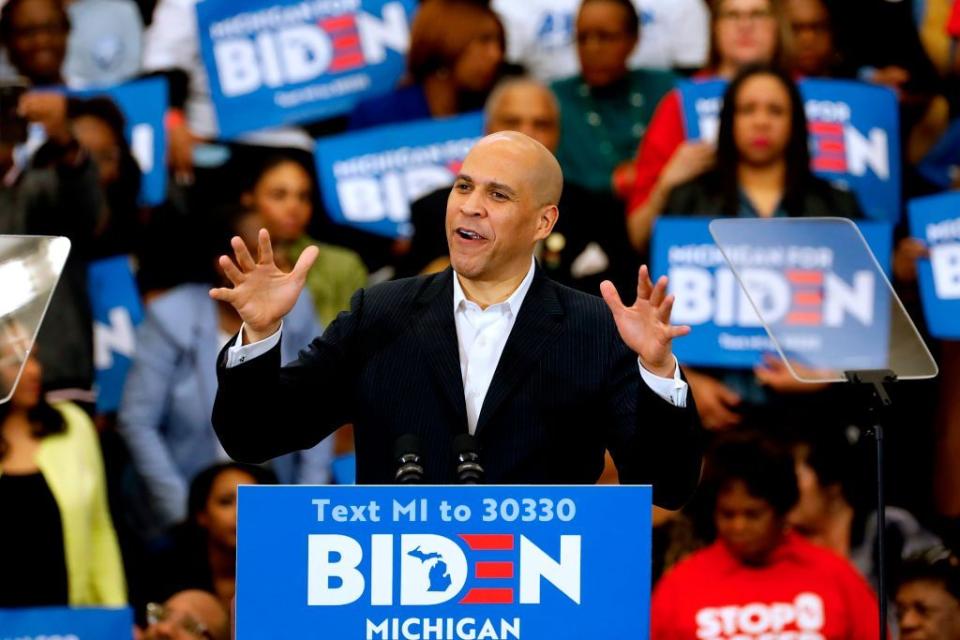Cory Booker Describes the Moment He Realized the Gravity of the Coronavirus Crisis

It’s been barely a year since New Jersey Senator Cory Booker “officially” launched his campaign for president in Newark last April 13.
The announcement fell on one of those clear, warmer days you couldn’t expect or plan for if you hadn’t paid attention to the weather, but that could instantly put you in a positive, spontaneous mood. You’d use that energy to get fresh, to get that deluxe car wash, to get a fresh blow out, or to pull out the grill. On that day, anyway, Booker got lucky: people showed up. (The recently departed Bill Withers’ classic “Lovely Day” blasted from the speakers as Booker appeared.) But Booker’s ultimate problem in the race wasn’t the cold weather, or the ability to draw a crowd. It was in the theory that he could run an extended and costly grassroots-style campaign fueled by earned media. As one of his aides told me as the campaign was winding down, the policy ideas only mattered as much as the press corps’ willingness to write about them.
Less than three months after suspending his campaign, Booker’s focus has shifted as the coronavirus crisis is taking its toll on his home state. As of April 6, New Jersey has more than 37,000 confirmed cases, and 917 deaths. Booker says he and his “team” have been “troubleshooting” all over the state, and that he himself had been making a lot of difficult calls to families and offering his condolences. That’s what he wanted to talk about when I asked him what had been on his mind that we hadn’t talked about. “Life is really fragile,” he said. And then he started to talk about his late father.
As far as campaigns go, Booker may have since shifted his attention to his Senate re-elect race, but he’s still thinking about the one for president. Unsolicited, Booker told me on the phone, “I ran a whole presidential campaign on this idea that our values as a nation should be reflected in the policies of our nation.” Later, he said he’d recently read an article that had made him hopeful about millennials, a voting bloc Democrats will need to show up in large numbers—and a group Booker himself still feels uniquely positioned to reach. Other than laying bare the fact that Booker, who turns 51 later this month, shares Gen Xers’ core media consumption trait of reading too many articles about the tendencies of millennials, it shows that he’s already thinking about how to transform politics post-virus.
After Booker was done working on the Senate’s $2 trillion plan to bring economic relief, he drove back to his home in Newark. From my home in Washington, I asked him why he appears to be writing more, and found out that while he’s still very still optimistic about America, he’s pretty queasy about the election.
Are you writing more as a comfort when you can’t be there because this virus is everywhere?
Yeah. I literally tell myself to fall asleep during times like this. Back when I was mayor I used to post my corny poetry and thoughts and messages all the time. I've now been sharing most of them personally with friends. I just started to put some stuff up. I've said to other my friends who are actual artists that, you know, we’re gifted with these platforms. It's the time that I think all of us should be putting our artistic spirit out there because art sustains art empowers, inspires, it heals. The prose that I often write are often messages to myself. I’m trying to remind others of who we really are.
A post shared by Cory Booker (@corybooker) on Mar 29, 2020 at 7:33pm PDT
What is the state of things for you right now?
There's a clarity in my days that I’m really appreciative of.
What do you mean?
I'm just grateful to be in a position where I can just be of help during this crisis. This is the kind of thing that always triggers the best of who we are. From my perch here in Newark, I just see everyday kindness, generosity, sacrifice, and true patriotism. My hope is that when this virus is finally beaten and subdued that that spirit continues.

So what was your personal reaction to news some of your colleagues knew acted in their own self-interest by dumping stocks?
I’ve got a lot of problems, and casting judgment on others respectively only slows me in all the work we have to do prospectively and in the present.
I don’t know how to get you to answer the question, but I can ask it again.
[Laughter] I mean, look. I don’t have any comment on the specific allegations because I’m not — I don’t know all the knowledge they had and all that went on. I think that there should be thorough investigations.
I remember Nancy Pelosi came up for a rally in New Jersey, I think in February. (Booker asked an aide listening in when the rally with Pelosi had been. “It seems like years ago now.”) I’d had a conversation with Phil Murphy, who was very keen to talk to me about what he was doing to prepare for this virus. We were talking with a level of urgency clearly not being felt by a packed rally—everybody was next to each other! But we’d already had this looming concern in this other conversation and then I’m thinking to myself, like, “Am I just being a nervous Nellie right now, or should we not be doing this with our House Speaker here?”
So I don’t know. I’m grateful for leaders who acted decisively and risked being scorned for it. My governor is one of those people. I saw a lot of medical professionals willing to take that risk as well. Those are the kind of leaders that I have a lot of gratitude for and I know I’ve got a lot of pressure on me right now.
How did being a mayor in a crisis inform your relief bill work?
I wanted to lead the charge on getting aid to states and localities, which wasn’t originally in the bill. During the recession and Hurricane Sandy, we were spending money like crazy. There are just countless layers of challenges. Just to do things like continue to pick up the garbage, frankly. I don't know if I can tell you everything—I don’t want to mess up our ability to get the bill done. But if a first responder dies of this virus we want to try to make sure families can keep their whole benefits as if they died in the line of duty. That’s what we had with 9/11. It’s the little things people don’t think of, but I’ve been a mayor. I lean a great deal on that experience as a senator but especially now. A lot of times when money comes to the cities, there's strings attached to it. But we wanted to make sure that every locality can use resources in a more flexible manner. We wanted to make sure that there were grants to help you pay for things you just need when you’re a local leader. These are all things that I relied on heavily when we were growing through some really difficult times.

What had you wanted to communicate to your colleagues and to the country with your speech on the Senate floor?
That probably for most Americans, this is the greatest threat to our country in our lives.
Many Republicans like Rand Paul for instance are being accused of not taking this seriously. As political leaders are they making this worse?
My concern is that soon we’re going to realize that we’ve all been through something that we need to learn from. Whether it was people who did celebratory things on the beaches during spring break, or a lot of personal decisions people made in the month of February, we’re collectively going to have to learn from this experience to understand how a pandemic functions. We all have to learn a lot of lessons. For instance, when we see the signs that we heed them and err on the side of caution and not be putting people at risk. There's just a lot to learn in the postmortem.

Did the legislation meet the magnitude of the moment to your mind?
I think Schumer did an extraordinary job of holding our caucus together and getting us all— from the progressive wing to the conservative wing — all of us to say that half-measures against a crisis that’s going to grow exponentially just isn’t going to be enough. Schumer held out in a way that pushed the bill pretty significantly because we were able to get more support for states and local governments.
In 2017, I personally witnessed Maxine Waters ask a young group of black millennials in D.C. to start calling for impeachment based on the fact that the Affordable Care Act was the most significant legislation ever designed to address racial healthcare disparities. You even demonstrated on this issue—it was a critical moment that explains a lot about how we got here.
At the time, we were fighting just to protect it. John Lewis was the first person I went to go get for that. Either millions of people would lose their healthcare, or we could get the votes to stop him. It was this very binary moment. Now, that bill didn’t get us to the “Promised Land” of universal coverage, but we were ultimately able to preserve the gains we made along that journey.
I used to talk a lot on the campaign trail that we lead the developed world and infant and maternal mortality. I’d say that other countries don't love their children more than we do but they have universal prenatal care and we don't. Not only is it morally congruent with the values of our nation, but it costs us more to not have universal prenatal care. So this virus has really exposed the incongruencies between our values and our systems. All of our systems are being exposed by this virus, and we’re seeing exactly why the security of our nation is based upon the wellness of our people.
Are you worried about the election yet?
I am worried about 2020 elections on lots of different levels. I'm worried about how we're going to vote, not to even mention how we're going to have conventions. I'm worried about a lot of the practicalities of the election. I'm up for re-election. The Senate and the presidency hangs in the balance and just look at what is being embodied in the highest leader in our land. But at the same time I am a person of faith. And right now I need to take care of what is wholly not political. And I think that sometimes actually that's the best politics: take care of people and the politics will take care of itself, perhaps.
This interview has been edited for clarity.
You Might Also Like

